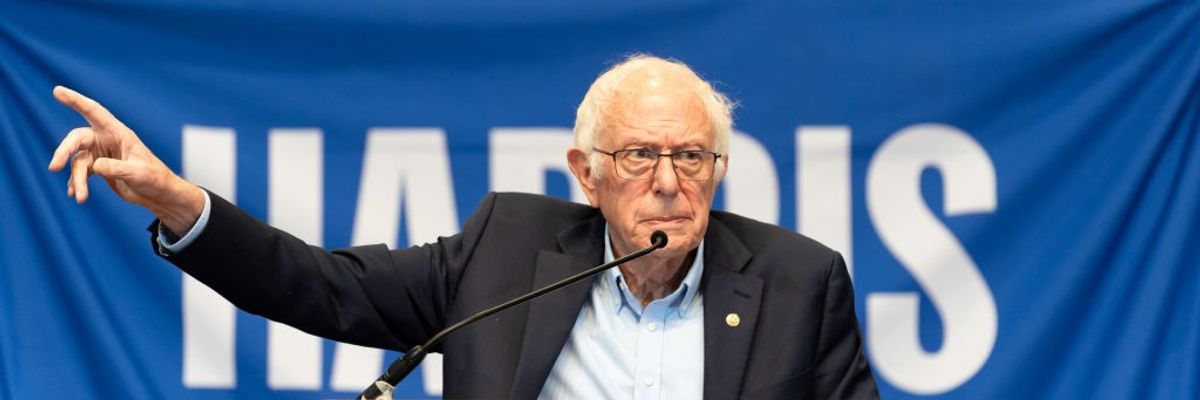Left Foot Forward
The senator accused the party of 'abandoning working class people'

Independent US senator Bernie Sanders has issued a damning critique of the Democratic Party after Donald Trump’s victory in the presidential election.
Sanders, who twice unsuccessfully sought the Democrats’ nomination for president, accused the party of ‘abandoning working class people’.
In a statement released on November 6, Sanders said: “It should come as no great surprise that a Democratic Party which has abandoned working class people would find that the working class has abandoned them. First it was the white working class, and now it is Latino and Black workers as well. While the Democratic leadership defends the status quo, the American people are angry and want change. And they are right.”
He then went on to say: “Today, while the very rich are doing phenomenally well, 60% of Americans live paycheck to paycheck and we have more income and wealth inequality than ever before. Unbelievably, real, inflation-accounted-for weekly wages for the average American worker are actually lower than they were 50 years ago.”
His statement concluded with a vicious critique of the Democratic Party. He said: “Will the big money interests and well-paid consultants who control the Democratic Party learn any real lessons from this disastrous campaign? Will they understand the pain and political alienation that tens of millions of Americans are experiencing? Do they have any ideas as to how we can take on the increasingly powerful Oligarchy which has so much economic and political power? Probably not.
“In the coming weeks and months, those of us concerned about grassroots democracy and economic justice need to have some very serious political discussions.
“Stay tuned.”
Chris Jarvis is head of strategy and development at Left Foot Forward

U.S. Sen. Bernie Sanders (I-Vt.) speaks at a labor rally for the Harris-Walz campaign in Harrisburg, Pennsylvania on October 27, 2024.
(Photo: Nathan Morris/NurPhoto via Getty Images)
"While the Democratic leadership defends the status quo, the American people are angry and want change," said the Vermont Independent. "And they're right."
Jessica Corbett
Nov 06, 2024
COMMON DREAMS
Shortly before Vice President Kamala Harris delivered her concession speech on Wednesday, U.S. Sen. Bernie Sanders forcefully called out Democratic Party leadership for losing the White House and at least one chamber of Congress to Republicans.
"It should come as no great surprise that a Democratic Party which has abandoned working-class people would find that the working class has abandoned them," Sanders (I-Vt.) said in a statement. "First, it was the white working class, and now it is Latino and Black workers as well."
"While the Democratic leadership defends the status quo, the American people are angry and want change," said the senator, who decisively won reelection on Tuesday as Republicans reclaimed the upper chamber. "And they're right."
After seeking the Democratic presidential nomination in 2016 and 2020, Sanders spent this cycle campaigning for Harris, warning of Republican President-elect Donald Trump's return, blasting billionaire involvement in U.S. politics, and urging Democrats to better serve working people.
"Will the big money interests and well-paid consultants who control the Democratic Party learn any real lessons from this disastrous campaign? ...Probably not."
In Sanders' new statement, he highlighted U.S. income and wealth inequality, worker concerns about artificial intelligence, and the federal government's failure to provide paid leave and universal healthcare while pouring billions of dollars into Israel's war on the Gaza Strip.
"Will the big money interests and well-paid consultants who control the Democratic Party learn any real lessons from this disastrous campaign? Will they understand the pain and political alienation that tens of millions of Americans are experiencing? Do they have any ideas as to how we can take on the increasingly powerful oligarchy which has so much economic and political power?" he asked. "Probably not."
"In the coming weeks and months those of us concerned about grassroots democracy and economic justice need to have some very serious political discussions," Sanders concluded. "Stay tuned."
Progressives—who have responded to Trump's Electoral College and popular vote win by criticizing billionaires who backed him and promising "unprecedented resistance" during his second term—echoed Sanders' remarks.
Sharing Sanders' statement on X—the social media platform owned by billionaire Trump backer Elon Musk—United Auto Workers (UAW) communications director Jonah Furman said: "The task has been clear for a decade. The question is only whether and when we will rise to the task."
Separately, the union's president, Shawn Fain, said in a Wednesday statement that "UAW members around the country clocked in today under the same threat they faced yesterday: unchecked corporate greed destroying our lives, our families, and our communities."
"We've said all along that no matter who is in the White House, our fight remains the same," Fain continued, pointing to the battle against "broken trade laws" like the United States-Mexico-Canada Agreement and fights for good union jobs, a secure retirement for everyone, a living wage, affordable healthcare, and time for families.
"It's time for Washington, D.C. to put up or shut up, no matter the party, no matter the candidate," added Fain, whose union endorsed Harris. "Will our government stand with the working class, or keep doing the bidding of the billionaires? That's the question we face today. And that's the question we'll face tomorrow. The answer lies with us. No matter who's in office."
"Will our government stand with the working class, or keep doing the bidding of the billionaires?"
In a post-election column, Chuck Idelson, former communications senior strategist for National Nurses United, made the case that "amid the postmortems and reckoning that will now follow the wreckage of Donald Trump's return to 'absolute' power, as authorized by the Supreme Court, there are... two notes in particular that deserve a deeper dive."
"In Missouri, a state Trump won by 58%, voters also acted to increase the state's minimum wage to $15 an hour and to require employers to provide paid sick leave to workers," he pointed out. "In Nebraska, another red state won by Trump, voters also passed a paid sick leave measure, Initiative 436, by 75%."
In addition to the ballot measures, Idelson highlighted that "in the multitude of exit poll results, one particularly stands out—94% of registered Republicans voted for Trump, the exact same percentage he received in 2020. The heavy campaign focus on pulling away Republican voters from Trump turned out to be a pipe dream. The old cliché 'it's the economy stupid,' triumphed again."
Harris' campaign, he argued, "reflected the direction the Democratic Party establishment has taken, away from working-class issues since the advent of neoliberal policies in the 1970s and carried out by most Democratic Party presidents since."
Historian Harvey J. Kaye, professor emeritus at the University of Wisconsin-Green Bay, took aim at the Democratic Party on social media Wednesday, noting failures to stand up to billionaires, raise the minimum wage, and pass the Richard L. Trumka Protecting the Right to Organize (PRO) Act.
Morris Pearl, chair of the Patriotic Millionaires and a former managing director at BlackRock, said in a Wednesday statement that "a self-avowed authoritarian successfully wielded the economic frustrations of millions to win the most consequential election of our nation's history. The Democratic establishment has only itself to blame."
"Voters demanded a fundamental overhaul of a rigged economic system. When neoliberal Democrats dithered, Donald Trump offered to clear the board, and voters chose the dark unknown rather than the status quo," Pearl added. "The only question remaining is, why are Democrats surprised? This is the entirely predictable result of a multidecade strategy to appease the rich that met no serious resistance."
The Sunrise Movement—a youth-led climate group that worked to reach millions of young voters in swing states to defeat Trump—similarly stressed on social media Wednesday that "last night's results were a call for change. Millions of people are fed up after living through decades of a rigged economy and corrupt political system. They are looking for someone to blame. It's critical the Dem Party takes that seriously."
"For decades, Democrats have prioritized corporations over people. This is the result. Every working American feels the crisis. We can't pay rent. Our government can't pass basic legislation. The WEATHER has turned against us. And Dems look us in the eye and say it's fine," the group continued. "Trump loves corporations even more than Democrats do, but he ran an anti-establishment campaign that gave an answer to people's desire for change."
"We can stop him, and we must," Sunrise said of Trump. "But it's going to take many thousands of people taking to the streets and preparing to strike. And it's going to take mass movements putting out a better vision for our country than Trumpism and proving that we can make it happen."
Intro from Ryan Grim:
Here’s a warning and an admonition written in January 2019 by author and organizer Jonathan Smucker: “If the Dem Party establishment succeeds in beating down the fresh leadership and bold vision that’s stepping up, it will effectively enable the continued rise of authoritarianism. But they will not wake up and suddenly grasp this. It’s on us to outmaneuver them and win.”
If you’ve been alive since then, you know that whoever the “us” was did not, in fact, outmaneuver them. Instead, the effort to build a multiracial working-class coalition was outmaneuvered by Democratic Party leaders. The progressive wing was subsequently allowed in by Joe Biden as a junior party in his coalition, and he was able to knock Donald Trump out of the White House. Under the Kamala Harris campaign, amidst a yearlong genocide in Gaza, that progressive wing was transitioned to silent partner at best, hostile faction at worst. Harris spent more time campaigning with Liz Cheney and Mark Cuban than Shawn Fain, the Sanders-esque leader of the United Auto Workers, fresh off his union’s historic victory in a strike against the Big Three automakers, who represent the pride of the industrial Midwest. The Washington Post managed to call her loss, mystefyingly, “a stinging verdict for the American left.“
Harris made lots of mistakes — not doing an interview for a month, hewing closely to Biden for no reason, not explaining why she changed positions, etc. — but her defeat was sweeping enough that we need to look for deeper structural answers. Smucker’s warning, that smothering the reform wing of the party would make it too weak to stand up to Trump, made sense at the time and is prophetic today. I’ve tracked the years-long arc of that ultimately losing fight with my colleague over at Breaking Points, Krystal Ball, and early this morning she put her thoughts on it into a short essay that we’re publishing below.
Bernie Would Have Won
By Krystal Ball
There are a million surface-level reasons for Kamala Harris’s loss and systematic underperformance in pretty much every county and among nearly every demographic group. She is part of a deeply unpopular administration. Voters believe the economy is bad and that the country is on the wrong track. She is a woman and we still have some work to do as a nation to overcome long-held biases.
But the real problems for the Democrats go much deeper and require a dramatic course correction of a sort that, I suspect, Democrats are unlikely to embark upon. The bottom line is this: Democrats are still trying to run a neoliberal campaign in a post-neoliberal era. In other words, 2016 Bernie was right.
Let’s think a little bit about how we got here. The combination of the Iraq War and the housing collapse exposed the failures and rot that were the inevitable result of letting the needs of capital predominate over the needs of human beings. The neoliberal ideology which was haltingly introduced by Jimmy Carter, embraced fully by Ronald Reagan, and solidified across both parties with Bill Clinton embraced a laissez-faire market logic that would supplant market will for national will or human rights, but also raise incomes enough overall and create enough dynamism that the other problems were in theory, worth the trade off. Clinton after all ran with Reagan era tax cutting, social safety net slashing and free trade radicalism with NAFTA being the most prominent example.
Ultimately, of course, this strategy fueled extreme wealth inequality. But for a while this logic seemed to be working out. The Soviet Union collapsed and the Cold War ended. Incomes did indeed rise and the internet fueled tech advances contributing to a sense of cosmopolitan dynamism. America had a swaggering confidence that these events really did represent a sort of end of history. We believed that our brand of privatization, capitalism, and liberal democracy would take over the world. We confidently wielded institutions like the World Bank, IMF, and WTO to realize this global vision. We gave China most-favored nation trade status.
Underneath the surface, the unchecked market forces we had unleashed were devastating communities in the industrial Midwest and across the country. By the neoliberal definition NAFTA was a roaring success contributing to GDP growth. But if your job was shipped overseas and your town was shoved into economic oblivion, the tradeoff didn’t seem like such a great deal.
The underlying forces of destruction came to a head with two major catastrophes, the Iraq War and the housing collapse/Great Recession. The lie that fueled the Iraq war destroyed confidence in the institutions that were the bedrock of this neoliberal order and in the idea that the U.S. could or should remake the world in our image. Even more devastating, the financial crisis left home owners destitute while banks were bailed out, revealing that there was something deeply unjust in a system that placed capital over people. How could it be that the greedy villains who triggered a global economic calamity were made whole while regular people were left to wither on the vine?
These events sparked social movements on both the right and the left. The Tea Party churned out populist-sounding politicians like Sarah Palin and birtherist conspiracies about Barack Obama, paving the way for the rise of Donald Trump. The Tea Party and Trumpism are not identical, of course, but they share a cast of villains: The corrupt bureaucrats or deep state. The immigrants supposedly changing your community. The cultural elites telling you your beliefs are toxic. Trump’s version of this program is also explicitly authoritarian. This authoritarianism is a feature not a bug for some portion of the Trump coalition which has been persuaded that democracy left to its own devices could pose an existential threat to their way of life.
On the left, the organic response to the financial crisis was Occupy Wall Street, which directly fueled the Bernie Sanders movement. Here, too, the villains were clear. In the language of Occupy it was the 1% or as Bernie put it the millionaires and billionaires. It was the economic elite and unfettered capitalism that had made it so hard to get by. Turning homes into assets of financial speculation. Wildly profiteering off of every element of our healthcare system. Busting unions so that working people had no collective power. This movement was, in contrast to the right, was explicitly pro-democracy, with a foundational view that in a contest between the 99% and the 1%, the 99% would prevail. And that a win would lead to universal programs like Medicare for All, free college, workplace democracy, and a significant hike in the minimum wage.
These two movements traveled on separate tracks within their respective party alliances and met wildly different fates. On the Republican side, Donald Trump emerged as a political juggernaut at a time when the party was devastated and rudderless, having lost to Obama twice in a row. This weakened state—and the fact that the Trump alternatives were uncharismatic drips like Jeb Bush—created a path for Trump to successfully execute a hostile takeover of the party.
Plus, right-wing populism embraces capital, and so it posed no real threat to the monied interests that are so influential within the party structures. The uber-rich are not among the villains of the populist right (see: Elon Musk, Bill Ackman, and so on), except in so much as they overlap with cultural leftism. The Republican donor class was not thrilled with Trump’s chaos and lack of decorum but they did not view him as an existential threat to their class interests. This comfort with him was affirmed after he cut their taxes and prioritized union busting and deregulation in his first term in office.
Meanwhile, the Democratic Party put its thumb on the scales and marshaled every bit of power they could, legitimate and illegitimate, to block Bernie Sanders from a similar party takeover. The difference was that Bernie’s party takeover did pose an existential threat—both to party elites who he openly antagonized and to the party’s big money backers. The bottom line of the Wall Street financiers and corporate titans was explicitly threatened. His rise would simply not be allowed. Not in 2016 and not in 2020.
What’s more, Hillary Clinton and her allies launched a propaganda campaign to posture as if they were actually to the left of Bernie by labeling him and his supporters sexist and racist for centering class politics over identity politics. This in turn spawned a hell cycle of woke word-policing and demographic slicing and dicing and antagonism towards working class whites that only made the Democratic party more repugnant to basically everyone.
This identity politics sword has also been wielded within the Democratic Party to crush any possibility of a Bernie-inspired class focused movement in Congress attempted by the Justice Democrats and the Squad in 2018. My colleague Ryan Grim has written an entire book on this subject so I won’t belabor the point here. But suffice it to say, the threat of the Squad to the Democratic Party’s ideology and order has been thoroughly neutralized. The Squad members themselves, perhaps out of ideology and perhaps out of fear of being smeared as racist, leaned into identitarian politics which rendered them non-threatening in terms of national popular appeal. They were also relentlessly attacked from within the party, predominately by pro-Israel groups that an unprecedented tens of millions of dollars in House primaries, which has led to the defeat of several members and has served as a warning and threat to the rest.
That brings us to today where the Democratic Party stands in the ashes of a Republican landslide which will sweep Donald Trumpback into the White House. The path not taken in 2016 looms larger than ever. Bernie’s coalition was filled with the exact type of voters who are now flocking to Donald Trump: Working class voters of all races, young people, and, critically, the much-derided bros. The top contributors to Bernie’s campaign often held jobs at places like Amazon and Walmart. The unions loved him. And—never forget—he earned the coveted Joe Rogan endorsement that Trump also received the day before the election this year. It turns out, the Bernie-to-Trump pipeline is real! While that has always been used as an epithet to smear Bernie and his movement, with the implication that social democracy is just a cover for or gateway drug to right wing authoritarianism, the truth is that this pipeline speaks to the power and appeal of Bernie’s vision as an effective antidote to Trumpism. When these voters had a choice between Trump and Bernie, they chose Bernie. For many of them now that the choice is between Trump and the dried out husk of neoliberalism, they’re going Trump.
I have always believed that Bernie would have defeated Trump in 2016, though of course there is no way to know for sure. What we can say for sure is that the brand of class-first social democracy Bernie ran on in 2016 has proven successful in other countries because of course the crisis of neoliberalism is a global phenomenon. Most notably, Bernie’s basic political ideology was wildly successful electorally with Andrés Manuel López Obrador and now his successor Claudia Sheinbaum in Mexico, Lula Da Silva in Brazil, and Evo Morales in Bolivia. AMLO, in fact, was one of the most popular leaders in the entire world and dramatically improved the livelihoods of a majority of his countrymen. Bernie’s basic ideology was also successful in our own history.
In the end, I got this election dead wrong. I thought between January 6th and the roll back of human rights for women, it would be enough. I thought that the overtly fascist tendencies of Donald Trump and the spectacle of the world’s richest man bankrolling him would be enough strikes against him to overcome the problems of the Democratic Party which I have spoken out about for years now–problems Kamala Harris decided to lean into rather than confront. Elevating Liz Cheney as a top surrogate was not just a slap in the face to all the victims of American imperialism—past and ongoing; it was a broad signal to voters that Democrats were the party of elites, playing directly into right-wing populist tropes. While the media talked about it as a “tack to the center,” author and organizer Jonathan Smucker more aptly described it as “a tack to the top.” And as I write this now, I have zero hope or expectation that Democrats will look at the Bernie bro coalition and realize why they screwed up. Cable news pundits are already blaming the left once again for the failures of a party that has little to do with the actual left and certainly not the populist left.
Instead, Trump’s victory represents a defeat of social democratic class-first politics in America—not quite final, but not temporary either. The Democrats have successfully smothered the movement, blocked the entranceways, salted the earth. Instead they will, as Bill Clinton did in the ‘90s, embrace the fundamental tenets of the Trumpist worldview.
They already are, in fact. Democrats have dropped their resistance to Trump’s mass deportation policies and immigrant scapegoating. The most ambitious politician in the Democratic coalition, Gavin Newsom, is making a big show of being tough-on-crime and dehumanizing the homeless. Democrat-leaning billionaires like Jeff Bezos who not only owns Amazon but the Washington Post have already abandoned their resistance.
Maybe I will be just as wrong as I was about the election but it is my sense that with this Trump victory, authoritarian right politics have won the ideological battle for what will replace the neoliberal order in America. And yes, I think it will be ugly, mean, and harmful—because it already is.











